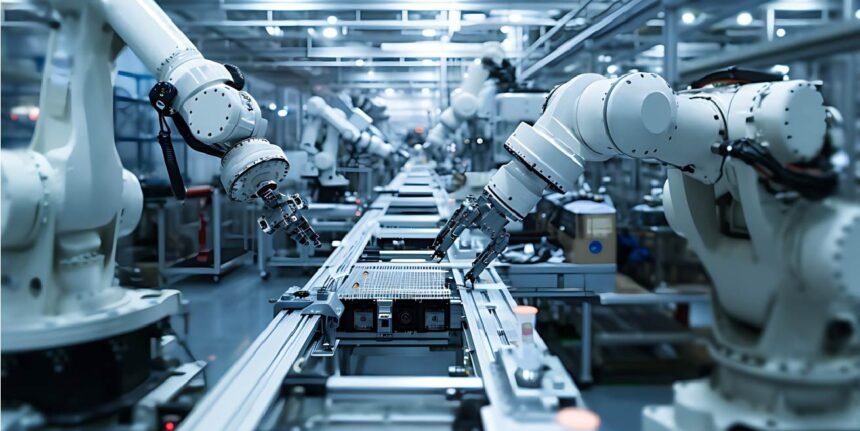Take a step inside a new age machine shop, and you will notice something shocking, the familiar scene of people with micrometers and dials, checking and adjusting is no longer there, it was replaced by systems performing real-time decisions autonomously. There has been a revolution in the provision of CNC machining services as they have turned into the complete partners in the innovation without any noise or fanfare.
The production line that seemed to be a simple process has turned to some intricate manifestation of the artificial intelligence, the higher materials sciences, and the induced digitization. Top manufacturers no longer use CNC machining companies to cut metal, but to address confusing engineering problems, speed up product development process, and even establish green manufacturing as well as be leaders in green manufacturing. It is not simply a technological progression: this switch is a whole reinvention of what can be done in precision manufacturing.
The New CNC Toolbox: Technologies Redefining Possibilities
These days the most sophisticated CNC machining operations feel more like a tech start up than a machining shop. In the middle of this revolution is a slew of innovative technologies:
Machine Adaptive systems using AI are already adjusting feeds speeds and real-time cutting forces and tool wear and material characteristics to ensure maximum performance. These systems will pick up and improve after each of their operations and this improves their efficiency without being told by a human. After adapting this technology one of the aerospace suppliers experienced 40 per cent savings in machining time already experienced in titanium parts.
Another step to the future is hybrid manufacturing. Advanced stores now bring in additive and subtractive tasks in fluid work stream. What if you could simply 3D print a near-net-shape part that has surface features like internal channels, and finish the critical surfaces to better than micron tolerances all done in the same setup on a CNC milling machine? This process has been found especially useful in complex medical implants as well as in ultra lightweight aerospace structures.
Material Intelligence: CNC’s Unsung Competitive Edge
Although the showy technologies steal the limelight, material expertise is the key to the services at the top level of CNC machining. Even the most advanced stores today have taken a giant leap beyond simple aluminum and steel and are having a mastery of exotic alloys and composites that a decade ago could and would have been machine impossible.
Superalloys Superalloys made of nickel such as Inconel have been the scourge of machinists, but are now commonly machined using special tooling and milling techniques. A single energy company saved 30% of their costs of turbines in terms of the components because it discovered a CNC partner which could work on machining these high-temperature alloys effectively.
Perhaps most impressive are the surface finishes now achievable. Medical device manufacturers regularly attain Ra values below 0.2 microns directly from the machine – finishes so smooth they meet implant-grade requirements without manual polishing. This capability alone has reshaped product development timelines in the orthopedic industry.
The Speed-Quality Paradox Solved
For decades, manufacturers accepted an unshakable rule: you could have speed, or you could have quality, but never both. Modern CNC machining services have shattered this paradigm through a combination of technological innovation and process intelligence.
High-speed machining strategies now combine ultra-precise linear motors with advanced toolpath algorithms. One automotive supplier achieved a 70% reduction in cycle times for transmission components while simultaneously improving tolerance adherence. The secret? Software that optimizes every tool movement for both speed and accuracy.
The most forward-thinking shops now offer guaranteed first-part-correct services for qualified components. This bold promise stems from their confidence in integrated quality systems that monitor over 200 process variables simultaneously, ensuring every cut meets specification from the very first piece.
Sustainability Through Smart Machining
The green revolution has reached the machine shop floor, transforming CNC machining services from energy-intensive operations into models of sustainable manufacturing. Forward-thinking providers now deploy technologies that slash environmental impact while improving bottom-line results.
Spindle innovations tell part of the story. New permanent magnet motors and optimized power curves reduce energy consumption by up to 40% compared to conventional systems. One high-volume aerospace supplier cut their annual power usage by 2.3 million kWh after retrofitting their CNC fleet – equivalent to removing 300 passenger vehicles from the road.
Material recovery systems complete the sustainability picture. Advanced chip management solutions now separate and reclaim 98% of metal waste, with some shops achieving near-closed-loop material flows. The economics prove compelling: a medical device manufacturer reduced raw material costs by 22% after implementing such systems.
CNC as a Service (CNCaaS): The Flexible Future
Cloud-connected manufacturing platforms now enable secure, real-time collaboration between designers and machine shops. A Silicon Valley startup recently leveraged such a system to iterate a drone component through fourteen design revisions across three different CNC service providers – all within a 72-hour window and without any physical handoffs.
Capacity scaling represents another game-changer. Automotive suppliers facing unpredictable EV demand spikes can now instantly access additional CNC capacity through vetted networks. One Tier 1 supplier avoided $4 million in equipment expenditures by utilizing such on-demand services during peak production periods.
The model particularly benefits innovators working with proprietary materials or processes. Rather than sharing sensitive IP with multiple vendors, companies can upload encrypted design files to platforms that distribute manufacturing instructions without exposing core intellectual property.
Conclusion: CNC Machining as Your Innovation Partner
The modern CNC machining services on the market have nothing much in common with the former. Days are gone when they were mere job shops printing prints, they are now strategic business partners who can affect product design through their input, bringing down costs of manufacturing through time-saving in production and finding solutions to manufacturing problems that had become intractable.
The boundary keeps on moving. Already quantum-computing-optimized toolpaths and automatically corrective machining systems are being tried out by early adopters, which predict rather than correct defects. The only constant is that CNC machining is still key in turning great ideas into something physical.
The message to companies that are willing to go beyond the traditional manufacturing methods is simple, Your CNC partner should be doing a lot more than simply making chips, they need to be making breakthroughs. Most progressive companies today do not consider their machining suppliers as vendors, but as important appendages of their development departments.







